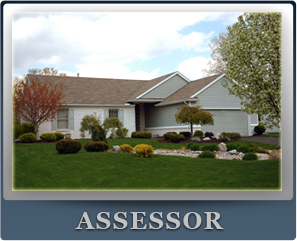Julie Stenger – Assessor
301 N Jeffers Rm 110A
North Platte, NE 69101
308-534-4350 Ext 4170
9:00 a.m. – 5:00 p.m.
Monday – Friday
The County Assessor has the duty to value all real and personal property in the county as a basis for the county board to levy taxes. The assessor must be certified by the Department of Revenue in order to hold office and annually attend a training session. Nebraska Assessors Explained video.
How Values Change
- Fluctuations in the Market
- Outside Influences on the property
- Addition or removal of improvements
- Remodel or rehabilitation
Property Tax Exemptions
- Educational facilities
- Religious facilities
- Charitable facilities
- Cemetary facilities
- Certain seniors or persons with disabilities
Duties and Qualifications
The County Assessor is an elected official who has the general supervision over and the direction of the assessment of all property in his or her county. The duties are prescribed by Nebraska Statutes, Rules and Regulations (Chapter 77), which have the effect of law. The following is a partial list of those duties:
- Administer the assessment statutes of Nebraska law.
- Establish and maintain fair and equitable value on all real and personal property within the county.
- Attend all meetings of the County Board of Equalization.
- Review all applications for religious, charitable and educational tax exemptions.
- Maintain cadastral records (i.e., parcel maps) on all property in the county.
- Prepare abstract of value and certification of taxes levied for State Property Tax Administrator.
- Prepare annual tax roll for the County Treasurer.
- The County Assessor must hold and maintain a valid certificate.
- Attend workshops for continuing education hours.
- Obtain a minimum of 60 hours of continued education during a term of office.
General Information Available from this office:
- Tax district information on a property in Lincoln County
- Ownership of a property in Lincoln County
- Valuation information on a property in Lincoln County
- Valuation of improvements on a property in Lincoln County
- Age of a structure in Lincoln County
- Size and dimensions of a parcel in Lincoln County
- Eligibility information on Homestead Exemptions
- How to file a property protest in Lincoln County
County Assessor Frequently Asked Questions (FAQ)
How are my taxes calculated?
Tax rates are established as a result of a budgetary process. Each governmental agency provides a budget that will cover the cost of maintaining their respective agency for a fiscal year. The budget requirements are totaled and that amount is divided by the total assessed value of property for that subdivision to establish the tax rate. The tax rate is stated as a percent or amount due for each $100 of assessed value. THE COUNTY ASSESSOR IS NOT RESPONSIBLE FOR ESTABLISHING THE TAX RATE.
What is real property?
Real property includes all lots and land, buildings, fixtures and improvements and mobile homes, which are used for residential, office, commercial, and agricultural purposes.
What is taxable personal property?
Personal property is defined as tangible, depreciable income producing property including machinery and equipment, furniture and fixtures.
Who must file a Nebraska personal property return?
- Anyone that owns or holds any taxable, tangible personal property on January 1, 12:01 a.m. of each year.
- Anyone that leases personal property to another person.
- Anyone that leases personal property from another person.
- Anyone that brings personal property into Lincoln County between January 1 at 12:01 a.m. and July 1, must list the property for assessment before July 31, unless it can be shown that the personal property was purchased after January 1 or that it was listed for assessment in another jurisdiction.
What is Special Valuation?
Special Valuation is a scenario whereby qualifying agricultural land may be valued without regard to market influences that cause the value to be inflated to an amount exceeding it’s agricultural value. This procedure allows property owners that wish to continue the agri-business nature of their property to do so without the value of their property being inflated by residential or commercial development. If you wish to apply for special value, you must file a form 456 in the Assessor’s Office by June 30th.
Can I protest my taxes?
No. You can only protest your valuation.
How do I protest my valuation?
First, contact the assessor’s office and have an appraiser explain to you how your value was arrived at. This gives the assessor a chance to correct possible errors and answer your valuation-related questions. You may file an appeal of your valuation with the county board of equalization at the clerk’s office during the dates prescribed on your valuation notice. You may appeal your valuation only, not your tax bill.
How do I convince the county board of equalization that my valuation should be lowered?
Present evidence that the assessor has valued your property above it’s market value or is not equalized with similar properties in the county.
What if I disagree with the county board’s determination?
You may file an appeal to the Tax Equalization and Review Commission.
Mobile Home FAQ
Where do I go to register my mobile home?
When purchasing a mobile home the first step is to obtain a title from Motor Vehicle Registration. A 521 Mobile Home transfer statement should be filed with Motor Vehicle Registration too. This form lets us know who the buyer and seller is, how the home was transferred, where the home is currently located and where it is was at the time of purchase, basic information on the home itself, the legal description, and the purchase price.
What if I sell my mobile home?
When you sell your mobile home you must prorate the taxes yourself between buyer and seller. The county does not prorate taxes. You will sign the title off to the new owner and they will start the process all over again. If you sell a mobile home and the title & form 521MH is not filed with Motor Vehicle Registration by the new owner, the ownership & tax statement will remain in your name until this information is obtained.
What if I move my mobile home?
Before you move a mobile home a moving permit is required by the moving company. A permit will not be issued until the back & current taxes are paid up to date. That requires accelerating or making taxes due now instead of at the end of the year. Moving a mobile home without accelerating taxes is punishable with a class four misdemeanor.
What do I have to do if I own a Mobile Home Park?
If you own a mobile home court, you must provide our office with an annual court report listing the date the mobile home was parked, the lot number it is located on, the owner of the mobile home, the make, year, width and length of the mobile home. The annual court report is required by January 15th of every year. Failure to make this report shall result in cancellation of the permit issued and forfeiture of the fee paid. Any person violating these provisions shall be guilty of a class four misdemeanor.
Permissive Exemptions FAQ
Who can qualify?
An organization which is the owner of real or tangible personal property, or licensed motor vehicles, and is seeking a property tax exemption may file for an exemption if:
1. The property is owned by and used exclusively for agricultural or horticultural societies; or,
2. The property is:
- Owned by educational, religious, charitable or cemetery organizations;
- Used exclusively for educational, religious, charitable or cemetery purposes;
- Not owned or used for financial gain or profit to either the owner or user;
- Not used for the sale of alcoholic beverages for more than 20 hours per week; and
- Not owned or used by an organization which discriminates in membership or employment based on race, color or national origin.
When do we file?
You may file anytime in the month of December.
What do we need to bring?
Every four years you will have to bring in information such as name of organization, title of officers, directors, or partners and their addresses, and a detailed description of the use of the property. The other three years you will only need to sign the form.
What if we forget to sign?
An organization or society which fails to file an exemption application on or before December 31 may apply on or before June 30th to the county assessor. The organization or society shall also file in writing a request with the county board of equalization for a waiver so that the county assessor may consider the application for exemption. The county board of equalization shall grant the waiver upon a finding that good cause exists for the failure to make application on or before December 31. If a late filing is made, the Assessor shall assess a penalty of 10 percent of the tax that would have been due had the affidavit not been filed or one hundred dollars, whichever is less, for each calendar month or fraction thereof for which the filing of the affidavit missed the December deadline.
Listed below are links to forms commonly used in the Assessor’s office.
What is taxable personal property?
Personal property is defined as tangible, depreciable income producing property including machinery and equipment, furniture and fixtures.
Who must file a Nebraska personal property return?
- Anyone that owns or holds any taxable, tangible personal property on January 1, 12:01 a.m. of each year.
- Anyone that leases personal property to another person.
- Anyone that leases personal property from another person.
- Anyone that brings personal property into Lincoln County between January 1 at 12:01 a.m. and July 1, must list the property for assessment before July 31, unless it can be shown that the personal property was purchased after January 1 or that it was listed for assessment in another jurisdiction.
What information do I need for a Personal Property Return?
Information on a schedule includes: Name, Mailing Address, Physical Address, Description of Property, Year Property is Purchased, Number of Units Purchased, Years Depreciated, and Taxable Value. Years depreciated depends on the type of equipment.
When do I need to file my return?
The schedule must be signed and filed every year between January 1st and on or before May 1st letting us know what was owned as of January 1st. If a schedule is not signed and filed on or before May 1st a 10% penalty will be added to the tax bill. If a schedule is not signed and filed on or before July 31st, on August 1st a schedule will be prepared by our office for you and a 25% penalty will be added to the tax bill.
If I pay sales tax do I still have to pay Personal Property Tax?
Yes. There is a common misconception that you may choose to pay either the sales tax or property tax…this is not true.
For more information see the Department of Revenue Property Assessment Division website.
The County Assessor supervises and directs the assessment of all property in Lincoln County. Duties include: establishing, maintaining and equalizing values on real and personal property, reviewing applications for tax exemptions (real and personal property) and preparing abstracts for the state of value and certification of taxes levied. Real property that is subject to taxation must be assessed as of January 1st of each year and value is determined using the mass appraisal method based on sales and market.
Tax rates are established as a result of a budgetary process. Each governmental agency provides a budget that will cover the cost of maintaining their respective agency for a fiscal year. The budget requirements are totaled and that amount is divided by the total assessed value of property for that subdivision to establish a tax rate. The tax rate is stated as a percent or amount due for each $100 of assessed value. THE COUNTY ASSESSOR IS NOT RESPONSIBLE FOR ESTABLISHING THE TAX RATE.
Property Values may be protested between June 1st and June 30th. A protest form must be submitted to the County Clerk and a hearing time and date be set to go before the Referee to the County Board of Equalization.
You can fill in the Valuation Protest Form 422 here.
You can fill in the Valuation Protest Form 422A here.




